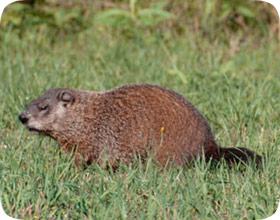- info@wildlife-removal.com
Call us for help in your town
Wildlife Removal Education
How to Kill a Groundhog with Poison
Need groundhog removal in your hometown? We service over 500 USA locations! Click here to hire us in your town and check prices - updated for year 2020.
Many people turn to poison to get rid of their groundhog problems. There are several types of poisons on the market and they all work in various ways; with the end result death of the groundhog. Fumigation is a method under which gaseous pesticides or fumigants are used in the entire area to suffocate or poison the groundhogs within. The most widely used and preferred fumigant is Methyl Bromide. However, we need to understand that use of poison to get rid of groundhogs affects the human health as well. It is toxic to almost all forms of life and that includes human beings as well and should be used with extreme caution. Read the guide Should You Ever Poison A Groundhog?
Yellow fly bait crystals are another form of poison that kills them all at once. Again, the animals suffer from various reactions to the poisons and this is not the most humane way to rid yourself of the groundhog problem.
Strychnine is another popular form of poison that many turn to as a method of getting rid of rodent problems. Strychnine works by suffocating the animal.
There are several things to consider before using poison to get rid of your groundhog problems.
1. It is inhumane as the animal can suffer greatly. Poisons do not always, or even usually, act instantly. Most of the time, animals suffer from the effects of poison and this can last for days. The groundhog may suffer from internal bleeding, suffocation, loss of muscle control, convulsions, painful sores in and around the nose and mouth, blindness and a host of other painful effects.
2. It may be illegal to use certain poisons for certain animals. Rat poison, for example, cannot be used for other types of animals.
3. Finding the right type of poison for the right animal can be a challenge. In general, the only effective and legal poisons are rodenticides for rats and mice. There is no such thing as an effective woodchuck poison.
4. Many times non-targeted animals, including your favorite pets, can get a hold of the poison instead of the groundhogs.
5. Poisoning an animal will lead to its death which means you will end up with a bunch of dead carcasses rotting and smelling up the area.
6. The cleanup process after poisoning the animals is time consuming and can cost both in health issues and sterilizing materials to properly clean the areas to prevent diseases. Read the guides How To Tell if an Active Groundhog is Rabid, Diseases Groundhogs Carry and Symptoms of A Sick Groundhog.
7. Poisons meant to rid animal problems can also affect humans as well.
If you have a groundhog problem, poison is not your only option and is not the preferred method either. It is dangerous to other animals and humans alike and is inhumane to the animal. There are many other humane ways to rid yourself of your groundhog problem. Read the guide Are Groundhogs Good Pets?
Click here for my nationwide list of 100's of pro groundhog trappers serving all 50 states.
 Groundhogs are usually classified as a pest species due to their habits of digging and eating crops. The most common complaints include the following:
Groundhogs are usually classified as a pest species due to their habits of digging and eating crops. The most common complaints include the following:
- Large burrow next to home
- Large burrow under deck
- Garden/landscaping being eaten
About Groundhogs
Groundhogs are rodents that belong to the largest group of mammals known as Rodentia. It is interesting to note that they are the largest members of the squirrel family and are also known as woodchucks. One of their favorite acts is digging holes. They are either completely black or white in color. Groundhogs spend most of their time eating or sunning when they are not hibernating or caring for their young ones. They particularly like tomatoes and fruits. Read more about how large groundhogs can get.
Groundhogs are real experts in digging and can dig deep into the ground and thus gain access to the food they like. They cause a lot of damage around the homes if they choose to dig under foundations and other vulnerable areas. Since they take out the mud from the base of buildings, they can cause serious damage to the entire structure. Groundhog holes can be dangerous for some pets as well if they happen to step into a hold and break or injure a leg.
While dealing with groundhogs, woodchuck repellants, deterrents, mothballs or sprinkling coyote urine around the yard can help to deter the varmints without using poison. A trap can catch hold of the groundhogs and thus eradicate the problems. However, in case you are living in an area where there are pets which have access to all areas, you would need to be careful where you place the traps. Read the guide Can You Use Ammonia or Mothballs to Repel Groundhogs?
Epsom salts are of great help when sprinkled on the fruits and vegetation of garden plants as it makes the food taste horrible to groundhogs. However, rain washes away the Epsom salts which means you will need to keep reapplying as necessary. Read more about Do Pest Control Companies Remove Groundhog? and What Wildlife Rehabilitators Do With Groundhogs.


















